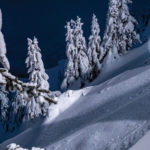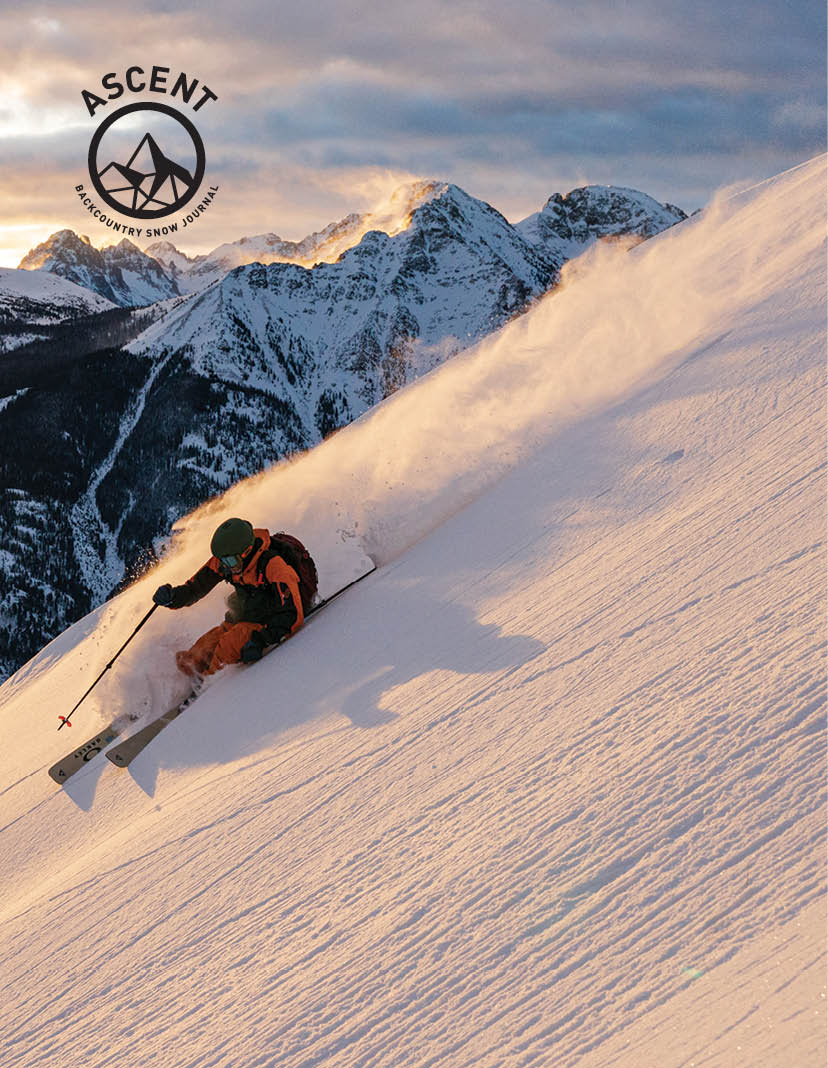I was directly responsible for an avalanche that almost killed a friend.
There. I said it. It’s a brutal reality, but it’s true. And it is hard to say. Which may be why – as avalanche forecaster Drew Hardesty pointed out in these pages last year -it’s possible that as many as 90% of human triggered avalanches don’t get reported. But report them we must, for our community and -more importantly –for ourselves.
In the January issue of Ascent, Noah Howell gave a great account of a scary avalanche that took a good friend for a long, terrifying ride that “only” resulted in a torn ACL, gear loss, a long struggle out, and a few tails between some legs. Along with a great description of all of the human heuristic failings that they made that day, one of Noah’s main points was that the sordid underbelly of the gloriousity of skiing untracked powder is that avalanches happen, but we as a community seem loathe to own up to them, much less report them.
As human beings, we make mistakes all the time; after all, “we are only human” (as I think maybe Confucious said. Or Copernicus?). With the clarity of hindsight we look back on many decisions we have made and wish we’d chosen differently, both on big and small decisions. Most of the time the “bad” decisions become fairly well-known to the community: you neglected to yield appropriately to an oncoming car and it crashed into you, and most of your friends find out and sympathize….because they’ve done it too. The choice you made at work resulted in a challenging situation for the company and your team, and everyone knows it was your call. However, they are paid to be part of the team, the team fixed the problem, and your coworkers have likely done something like that as well and were glad it wasn’t them this time. Most of the time we are generally okay with our mistakes, so why is it that causing an avalanche is such a social faux pas?
Perhaps it is a function of what Noah said; skiing is supposed to be always great (though this winter in the West it hasn’t been that great!) so we don’t want to rain on the community’s parade. And while that may have something to do with it, I think our reluctance to ‘fess up to causing an avalanche reflects the magnitude of the incident; that is, an avalanche can – and does – kill you. You get in a minor car wreck due to a momentary lapse and whatever, it’s a few thousand bucks and a big PIA but you are ok. You made a decision that will cost your company some money and your coworkers some time but that’s part of doing business. But you cross a slope safely and your friend follows you, triggers a slide, and gets buried 6 feet deep (as happened to me) and he’s potentially dead. That’s a big deal. And day after day after day the avalanche forecasters are saying, “Here’s what is happening don’t trigger an avalanche!” and yet you – you! – go out and trigger an avalanche. You’ve gotten caught with your hand in the cookie jar, but because the stakes are so much higher, it’s tempting and too easy to say, “I wasn’t stealing any cookies!”
The truth is that if you ski long enough and often enough in avalanche-prone terrain you are going to be involved in an avalanche, one way or another. It’s an unfortunate coincidence that avalanches are most common on 34-40 degree slopes and that’s also skiers’ preferred range of steepness. You can take as many classes as you want, memorize ALPTRUTH, study crystals and faceting and depth hoar and buried surface hoar and elevation/aspect, ski with all the experts you can, dig pits on every lap, take the snowpack’s temperature, ski in the trees, ski two days after a storm (well, no one actually does that on purpose!), yet eventually you’ll be involved in an incident. I did actually meet a guy last winter that’s been backcountry skiing in the Wasatch for over 20 years and has never had an incident, and we both marveled at that fact and he said he still fully expected it. So if everyone is going to have an incident at some point in time, why are we so afraid of owning up to it?
Just this morning I read of two avalanche incidents in the Wasatch. One resulted in a neck-deep burial, a deep laceration from a tree, and gear loss but even these details required a bit of sleuthing from the local avy center to find the folks who didn’t report the slide, and the other had a perfunctory description by a person who only used their initials. Psychologists would probably say this desire for anonymity is a fear of judgment, with its roots in insecurity. We all have our insecurities and we all want to avoid negative judgment, and in era where the interwebs’ participants can themselves be anonymous it seemingly brings out the worst in the voyeurists’ comments. Thus there is a very real threat of reading public verbal abuse about us.
So it takes a big swallowing of some innate pride and some mounting up to the fear of reprisals to say, as Noah did: “I fucked up.” It’s really, really difficult to do this, but as backcountry riders, we should relish it: if we wanted it to be easy, we’d be riding the cables instead of breaking trail for thousands of vertical through thigh deep 13% snow. Ironically, I think that the general public actually admires the strength of people who do indeed have the confidence to try to atone for their sins and educate others, and there are usually fewer negative comments applied to the decisions that led to an avalanche incident when there’s a thoughtful account by a person with a name and a face.
The community in turn needs to be accepting of others’ actions; it’s simply not appropriate to say “you are an idiot!” But it is very valuable to ask yourself honestly: “would I have been there and done that? “ Even if the answer is absolutely not, that is more a function of you, your experience, and your risk tolerance than it is of the reporting person, and is a strong educational exercise itself.
So too is the importance of fully accepting the responsibility for your actions. By keeping yourself anonymous to the community you are potentially not quite acknowledging to yourself the gravity of what you’ve done. Some years ago while working on my skis I glanced up up from scraping the extra p-tex out of a deep wound and realized that the uncorked gallon can of white gas that I’d been using to get the skin glue off my base was innocently sitting right next to the flaming blowtorch I was using to keep my p-tex lit; the hairs stood up on the back of my neck and my body temp instantly shot up as I realized I came perilously close to blowing myself and my house sky high. I may not have told my wife about this incident, but I should have in order to fully acknowledge my carelessness and reinforce that I should never do that again.
Skiing – and working on your skis – is almost always about goodness and it’s tempting to hang only onto this goodness, but we need to acknowledge to ourselves that it’s not always safe, and even though sharing our tales of our fallibility with others is difficult, it’s important for ourselves and the community to shrug off the potential stigma and…..’fess up.










Thanks for the story. After reading your account and others today, I was dismayed people would not be willing to tell their stories for fear of criticism since your account and those of others, no matter how the poor the judgement at the time, should help all of us reflect on future decisions. Just a note, watch the gas can.
Great post Tom. I agree with everything you said, but have two minor disagreements on tone. 1. We want to know an avalanche occurred, details are nice. If someone doesn’t want to identify and explain themselves that’s OK. Reporting just that an avalanche occurred is a great service. I always identify myself, but I’m usually too worked from the day with too little time to get dinner and get to sleep so I can get up early and go out and do it again to write an essay on the details of my decision-making. If we let the community know… Read more »